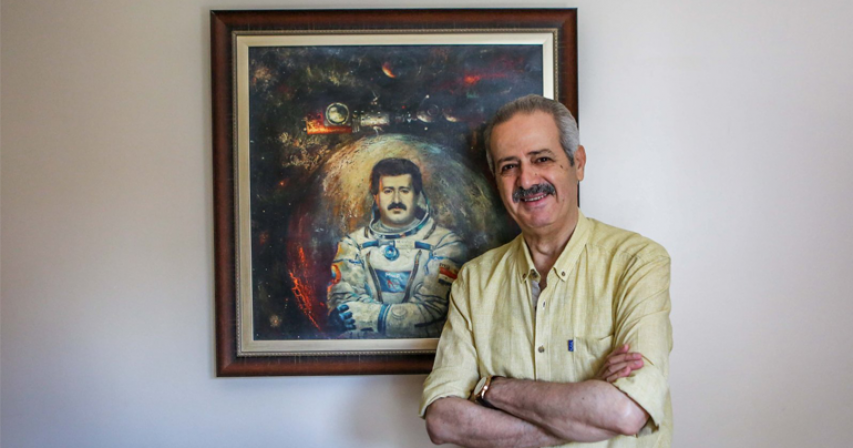1st Syrian astronaut says ready to work with Turkey in space
- 4 years ago

With stars in his eyes, Syria's first and only astronaut, who has been nicknamed the Neil Armstrong of the Arab world, now wants to help Turkey in achieving its space dreams
On a sweltering summer's day on July 22, 1987, aboard the Soyuz-T M3 spacecraft, Muhammed Ahmed Faris became the first Syrian astronaut to go into space and dock safely at the Russian Mir Space Station as part of the Interkosmos space program in cooperation between Syria and the Soviet Union. He spent 7 days, 23 hours and 5 minutes in space, looking down on Earth. He was honored as the Hero of the Soviet Union upon his return and later with the Order of Lenin. And now, the astronaut wants to help Turkey in its newly-launched space journey.
On the occasion of Turkey launching its national space program, we spoke to Faris, the first Syrian and second Arab to ever go into space.
The Aleppo-born Faris said he was happy to hear the announcement of a Turkish national space program, especially given the importance of space research today.
"This is a very big and ambitious project. It is very important in our era that you make a contribution to space ... and I say that he who has no feet in space has no feet on the ground," the 69-year-old told Daily Sabah Arabic.
Faris said he recently visited the Turksat Satellite Center and was briefed on Turkish space efforts. He said he was glad that Turkey was now able to manufacture its satellites with local and domestic means but hopes that the country will also soon be able to own its domestic launch stations and manufacture rockets to put satellites into orbit.
"Of course, implementing this is not an easy thing, as it requires huge material, scientific and technical capabilities. But surely the journey of a thousand miles begins with one step." Faris said.
The stage of selecting astronauts will perhaps be one of the biggest challenges awaiting Turkey. Faris said this selection must be careful and detailed, and adhere to strict specifications. The astronaut said he was more than ready to provide the necessary support and advice to the Turkish Space Agency (TSA).
He continued, "I hope that I will have a role in choosing the Turkish astronaut and that the Turkish Space Agency will communicate with me in this regard."
"As you know, the president of the Turkish Red Crescent, Kerem Kınık, previously described me as the first Turkish astronaut, as I became a Turkish citizen, and I would be happy to stand with the first Turkish astronaut and share with them my experiences in this regard."
Faris and his family were forced to flee to Syria after the civil war broke out in 2012, and settled in Istanbul's Fatih district as refugees.
.jpg)
For his show “Space Refugee,” on display at the Andrew Kreps Gallery in New York City, Halil Altındere explored the life of Muhammed Faris (L). (Archive Photo)
Regarding some opposition voices questioning Turkey's ability to move to the second phase of the program, which includes the implementation of a smooth landing on the moon by 2028, Faris said: “I am against skepticism and the underestimation of the capabilities of any person or project, let alone a national space project. The Turkish opposition is supposed to encourage those in charge of it instead of trying to thwart them, especially in the field of space ... Young people must be encouraged to take an interest in space sciences."
Underlining that behind a single satellite in space are thousands of specialists working to make it happen, Faris said that when it comes to sending an astronaut into space, relying entirely on your own domestic capabilities is a tremendous feat to achieve. The Syrian astronaut said Turkey was taking "sound steps" in the right direction with this program, and that he would stand by such efforts.
Faris, who currently gives lectures to students at various schools, stressed the need to pay attention to educating children from a young age and develop their abilities, especially with introducing children to space and science as early as possible.
On his assessment of the Arab youth’s interest in space and the status of space science in the Arab world, Faris said that, unfortunately, most Arab governments are not open to space explorations and not interested in developing the field or encouraging such endeavors among the youth.
When asked what his view of the world was through the eyes of an astronaut, Faris replied: "The most beautiful sight I have seen in my life was the view of Earth from space. I was very happy to see mother Earth. But the universe is (expansive and) terrifying and life in space is more difficult and cruel than anyone can imagine, and this brings me back to talks about the exceptional specifications the (prospective) astronaut will need."
Faris renewed his commitment for support and said his offer to the TSA to be on the selection committee still stands.
Comments